- Home
- Anson Cameron
Silences Long Gone
Silences Long Gone Read online
Allen & Unwin’s House of Books aims to bring Australia’s cultural and literary heritage to a broad audience by creating affordable print and ebook editions of the nation’s most significant and enduring writers and their work. The fiction, non-fiction, plays and poetry of generations of Australian writers that were published before the advent of ebooks will now be available to new readers, alongside a selection of more recently published books that had fallen out of circulation.
The House of Books is an eloquent collection of Australia’s finest literary achievements.
Anson Cameron was born in Shepparton, Victoria, in 1961. His first novel, Silences Long Gone, released in 1998, was shortlisted for the Commonwealth Writers’ Prize. He has since written four more novels—Tin Toys (2000), Confessing the Blues (2002), Lies I Told About a Girl (2006) and Stealing Picasso (2009)—and the short story collection Pepsi Bear and other Stories. He lives in Melbourne where he writes a column for The Age newspaper.
HOUSE of BOOKS
Anson Cameron
Silences Long Gone
This edition published by Allen & Unwin House of Books in 2012 First published by Picador, Pan Macmillan Australia Pty Ltd, Sydney, in 1998
Copyright © Anson Cameron 1998
All rights reserved. No part of this book may be reproduced or transmitted in any form or by any means, electronic or mechanical, including photocopying, recording or by any information storage and retrieval system, without prior permission in writing from the publisher. The Australian Copyright Act 1968 (the Act) allows a maximum of one chapter or 10 per cent of this book, whichever is the greater, to be photocopied by any educational institution for its educational purposes provided that the educational institution (or body that administers it) has given a remuneration notice to Copyright Agency Limited (CAL) under the Act.
Allen & Unwin
Sydney, Melbourne, Auckland, London
83 Alexander Street
Crows Nest NSW 2065
Australia
Phone: (61 2) 8425 0100
Email: [email protected]
Web: www.allenandunwin.com
Cataloguing-in-Publication details are available from the National Library of Australia
www.trove.nla.gov.au
ISBN 978 1 74331 395 4 (pbk)
ISBN 978 1 74343 093 4 (ebook)
Contents
Acknowledgements
Part 1
1 To Fight a Hag
2 Roses
3 Molly
4 Adrian the Catalyst
Part 2
5 Lorne
6 Bleeding
Part 3
7 Felling Trees
8 Sad Purple Dads
9 Red Cordial
10 Thaw
Part 4
11 Hollow Stick
12 Pissing Outdoors
13 Living Airless
14 The Fat Man Himself
Part 5
15 Windless Gullies
16 The Finger
Part 6
17 Mollycoddled Recidivists
18 All the Niceties
19 The Jesus Trap
20 Powerbook
Acknowledgements
Thanks to Fiona Inglis who is sharp enough to sell rumours, and to Nikki Christer who is brave enough to buy them and to drink in darkened bars with the rumour-mongers themselves. Thanks also to Judith Lukin-Amundsen. ‘Red Cordial’ first appeared as a story in Nice Shootin’, Cowboy.
For Sarah, blue-eyed chronic dawdler, I love.
Part 1
1
To Fight a Hag
They’re flying me across the country to fight a hag. They think to reason with. But I know to fight. Know the first weapon she’ll use against me is Hitler. How he went ahead and bombed her, though she was only a child and knew nothing of hate, high-explosives or flying bricks. Didn’t stop bombing her until she had learnt of hate and learnt of high-explosives and learnt of flying bricks. And learnt how to live on after people you knew you couldn’t live without had been killed.
You never slept under a table while the Nazis opened their bomb bays on your world, she will tell me. And she’ll nod at me like it explains and accounts for the proven deficiencies in me. You never awoke to see what people could do to people. You had mosquitoes in your childhood nights instead of the Luftwaffe is why you don’t understand how precious life is.
And I guess it won’t take us long to get from my first long-suffering sigh or her first triple tut of reproof to a declaration of war. I guess my first fuck-you of raised eyebrow or my first not-this-shit-again of eye-roll will bring her up off her steaming teacup and out from behind her tannin-stained teapot and around from behind her formica table top pointing crooked with that arthritic finger and regurgitating now, at last, every moment of hate that never quite passed between us but just built up and lay heavy in each of us.
And her snowballing accusations will lead to that shouted accusation she was trying to get herself up for all along. That I went ahead and killed him. For nothing but my own status. Wielded the exhaust-hose and wielded the scotch bottle and wielded the wet-eyed announcement of death like trophies. In order to claim him as my own. An act of straight-out pure self-aggrandisement … and don’t think it was anything more. Don’t think, for God’s sake, it was anything approaching noble.
Below us is the red line of the Great Northern Highway cutting north through country dusted yellow with spinifex. Here and there rock erupts pure red out of the yellow dusted landscape. The whole run of land is jolted with air-pocket and tilted with thermal updraught.
Every ten minutes or so there is a tiny shine of corrugated iron returning the sun. Homesteads surrounded by home paddocks overgrazed red by cattle mustered and ready for trucking up north and slaughtering and fractioning shrink-wrapped for shipping to first- or third-world Asia, depending on how the season was and what the quality of the beef is. Only one year in five is it good enough for the Japanese. The North Koreans will eat it straight out of a boiling red drought.
I ask the pilot to drop us down low, drop us down to a thousand feet, where we can see what we can see. Because also below us, uncoiled into a thousand kilometre string of buildings along the Great Northern Highway is my home town. Buildings joined now only by the CB radio chatter of the truckies arranging rendezvous for burgers and sleep along the road south. Hannah Civic Centre on the back of a Mack maybe parking next to Hannah High School assembly hall on the back of a Kenworth outside a roadhouse in Meekatharra. Or maybe on the back of a Ford in a rest area is the Hannah Courthouse parked alongside a Bedford with the jail on its back the courthouse filled for four decades. The Hannah brothel is maybe dropping its lace in a petrol station alongside the Hannah Walkabout Hotel that filled it for three.
The whole town, all its timber parts and all its tin parts and all its fibro parts, which is nearly all its parts, is driving south towards permanent green, to become outskirts of sandstone and brick towns with reasons to live.
Hannah was an iron-mining town. But now the iron ore is turned into cars that are hunkered low on flat tyres rusting into shitboxes worldwide and everyone who lived in the town has been moved on. Superannuated and retired. Or unemployed and waiting. Wondering where the next iron town will grow.
The pilot tells me okay he’ll lose some altitude, but with us travelling north at six-hundred kph and them south in dust at one-twenty kph and most of the buildings somewhat reconstructed for the journey I’ll need a real gift for reminiscence to get any kind of buzz out of it. He drops the Lear Gulfstream fast enough to lift my stomach and intestines and Margot Dwyer’s stomach and intestines and his own stomach and intestines, which is all the stomachs and intestines on board, hard up against whatever it is keep
s stomachs and intestines coming out throats and fast enough to make Margot groan in her sleep.
When we’re under a thousand feet he points out front of us at a small weatherboard church heading south out of the tropics on a semi-trailer with its aisle along the spine of the truck and its steeple sheared off for the journey. Its stained-glass windows have been bid out at auction and red dust is boiling up through its floor and out the empty window frames like it’s on fire. The Church of England.
What I remember of this church is if you sat third pew back from the pulpit you could look between the sandal straps and out through the transparent foot of a leadlight Jesus and see the thirteen-year-old girls of our town get themselves into states of undress before getting into their bathers ready for swim training in the town pool on a Sunday morning in summer. The under-fourteen freestyle class. Joking about the newfound danger of bikini-top fragility and feeling the novelty of first waxings and exposing brave illicit tans. Them not knowing anyone could see them in this corner of the pool yard. Not imagining anyone would take advantage of the transparency of the instep of our Saviour as commissioned by the Church of England to spy on them naked.
The other memory I take out of this church before it’s under us and behind us and south of us is of my last Sunday in it. The day I yelled a highly joyous ‘Blasphemy’ and then an outraged ‘Fuck’. The day Susannah Walter’s two-year-old daughter Taylor started me yelling by yelling a ‘Fuck’ of her own in a most amazing poignant pause the minister was staring down on us from the pulpit. Fuck wasn’t a sentiment anyone had expected from a little girl in a green velvet dress that everyone who didn’t have a little girl to compete for it agreed had a townwide monopoly on what they called sweetness. I was nine and I didn’t expect it so much I jumped off my pew, arms raised and shouted ‘Blasphemy’ and Mum ear-clipped me right out of the pew into the aisle not because of the fact I shouted in church, she explained later, or for what I shouted, but because of the highly joyous way I shouted it.
Me then shouting my ‘Fuck’ after the ear-clipping and the aisle-flopping because it had already been yelled once and was stuck in my mind.
Coming from a kid like me who didn’t have much Sweetness about me, they say, and certainly was never in green velvet, people shouldn’t have been as surprised at my Fuck as they were at the Fuck of Taylor Walters. But they were. Surprised. Outraged probably. And I was frog-marched out of that church and banned for what Mum called a probationary period but turned out to be forever.
‘That all you had for a church?’ the pilot asks like I’m an exposed heathen. I see myself angry twice in miniature in his Top Gun Raybans.
‘There was Catholic,’ I tell him. ‘But they’re not portable.’ The Catholics, like the third little pig, had built in brick. Which made their church the only brick building in Hannah. As kids we’d sometimes come and watch their church be brick because we’d only ever seen other buildings be weatherboard and corrugated iron and fibro. And we’d knock on it with our knuckles to feel it be brick and to feel how even soft knocking on a Catholic church could hurt. And we’d wonder at it and wonder what an amazing thing was a Catholic that he would bring his own actual bricks to keep away a devil and to keep away a wolf and to keep away a cyclone that the rest of us could keep away with only weatherboard and fibro and corrugated iron. Dad told us one time the Catholic devil was a more fierce competitor than our devil and that probably explained it. It wasn’t until we were much older we realised that church was brick just for the flat-out grandeur of brick.
That church probably has a wrecker’s ball taking a bite out of it right now because it wasn’t made for any sort of journey. Would have bled its stained-glass onto the roadside and shaken itself back to bricks before it got to the WELCOME TO HANNAH, HEART OF IRON COUNTRY. POPULATION 3000 sign.
Several more buildings run the highway below us before I recognise a schoolroom I did first, second and third grades in. A portable where Miss Scott taught us left from right and which I still conjure up in my mind’s eye to orientate myself when I’m asked which side of something something’s on.
The next structure I recognise is moving slow on a low-loader with a car out front with an orange light flashing advertising a wide load. It’s the Hannah football pavilion. OPTHALMIA GRANDSTAND the sign at the apex of its boomerang-shaped roof said.
I remember the sounds of the football games my father watched from that pavilion every Saturday morning for four years and that came to me across town to wherever I was that wasn’t at the football. The games of under ten, then under eleven, then under twelve and under thirteen football he coached and that he desperately wanted me to be part of. I remember he sat with his friends in that pavilion and told encouraging lies to them about their sons. Their leap, their anticipation, their pace, their general footy nous and potential.
Nowhere in town could I escape those boy-shrill calls of ‘SmithySmithySmithy’ for a handball or of ‘GregGregGreg’ for a stab-pass or loudest of all the ‘Yeees’ of high mark tailed off by umpires’ whistle and dead silence before the ‘Yeees’ of goal and the honking of car horns when my father was being mock-jocular in that pavilion with his friends while he watched their sons run, jump, kick, and learn lore he was desperate to teach me and was wondering what could be happening in my mind that could keep me from this. A boy would have to walk three miles out into the desert to escape those noises. And even out there the car horns of goal could set up a conversation with galah and crow and corella.
‘We’re a half-hour out of Hannah,’ the pilot tells us. The temperature upon arrival … will be bloody hot.’ He grins at his impersonation of a commercial pilot. Margot wakes and stretches and asks has she been asleep and supposes she has drifted off, what with the jet-hiss and all.
Margot is with BBK. The company that owns the town. Owned the town. In a legal capacity she tells me. She’s a lawyer. She’s met me at Essendon Airport and shaken my hand and ushered me into this jet and told me she’s so glad to meet me and she hopes they haven’t interrupted my week too much and told me thank you for helping out, but she knows I want to be involved anyway, and told me between us she’s sure we can come up with a solution that’s best for all concerned. All concerned in this case being the company she works for and the mother I’m estranged from.
She’s in her late twenties and got up in the outback spirit of the thing in an R.M. Williams white grandpa shirt and R.M. Williams baggy khaki shorts and R.M. Williams saddle-stitched belt and some white socks and R.M. Williams suede riding boots. Doesn’t know that Hannah was never part of the outback. Hannah was an island in it. A trucked-in civilisation of crisp salad and fresh seafood and city papers, all air-conned down to the twenty-four degrees of Celsius that surveys found was optimum comfort-level for mining families. Hannah was an island of union-enforced comfort with a heat-mirage ocean lapping at its fringes and lapping at its civilisation like barbarity.
‘Something for you to look over,’ Margot tells me. ‘Just so you can tell her what options there are and what a happy future and easy relocation we want her to have.’ She holds out a leather satchel across the aisle to me. Inside it are brochures from retirement villages. My mother’s options. Short bright futures deep in the Jason recliners of Eventide Lodges and Sundown Communities.
‘I can hear her when she gets a look at these,’ I tell Margot. Brochures of coastal cooperative retirement. I look through them. Their best offer is a flat in Albany with an ocean view. Rent-free until death. Air-conditioned coach rides to Perth leave daily, the brochure says.
‘My listening skills are really advanced,’ Margot tells me. And if she’d only like to talk it through with me … instead of locking herself into a corner position …’
Advanced enough that if she says something you want to hear you’ll hear it?’ I ask.
Margot takes in some of the country running underneath us and straightens her shirt that has twisted in her sleep and runs her hands up and down the skin of her thighs flatte
ning goosebumps and just generally postpones her answer until she whips around to me with it all of a sudden like it’s just come in and it’s hot and tells me, ‘I’m all about people, Mr Furphy. Someone like her is of far more concern to me than an abstract notion like a company. Even the one I work for. I didn’t do eight years of Law at uni not to help people. Let me ask you something: can you bear the thought of her living out there alone?’
I postpone my answer by taking in some of the country running underneath us because I don’t want to tell her a straight-out yes and be exposed as a straight-out heartless bastard this early in our relationship. And the main point of interest underneath us is that a truck carrying some building has clipped a cattle grid and the building has dropped its walls and they lie shattered on the roadside in aqua tangles of weatherboard and the roof has flipped high and is lying fifty metres off the road in a deadly jigsaw of asbestos sheet and the pilot says, ‘Somebody’s miscalculation,’ and tells us he hopes their House and Contents was paid up. And the time it takes for that house to be under us and behind us and gone is the time it takes me to boil up a lie like the, ‘No, I can’t,’ that I actually tell her.
And for her to tell me back, ‘Well, then.’
I read more brochures. In North Cottesloe, Perth, another beach-front location, is a village called Evensong of twenty-eight self-contained units with communal rooms for bridge and reading and folk sing-alongs. It has its own Art Deco chapel. It has a palliative care staff of four, one of whom doubles as a Thai-style masseur–whatever that means to a generation that knew the place as Siam. It’s all air-conditioned. And you can order meals-on-wheels in three cuisines, by phone or fax.
Margot is looking out her window again at the dribs and drabs of Hannah, at the telephone exchange and the chemist shop of Hannah going south in the red dust. She apologises for the question. Tells me she was out of line. Admits in a soft voice she’s had family dilemmas she wouldn’t even contemplate discussing with strangers. Some things about her father are terminally embarrassing, she says. She watches one half of a Mobil garage slide back under her wing and admits, ‘He’s a ballroom dancer. Specialising Latin American. Dances the Masters circuit. Calls himself the Sultan of Samba.’

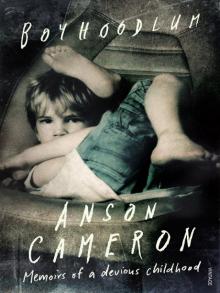 Boyhoodlum
Boyhoodlum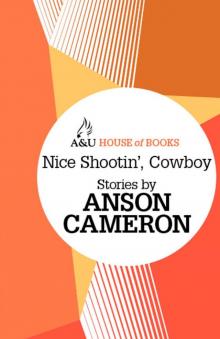 Nice Shootin' Cowboy
Nice Shootin' Cowboy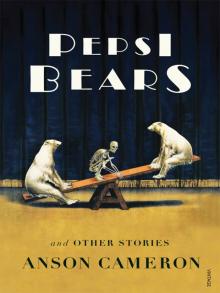 Pepsi Bears and Other Stories
Pepsi Bears and Other Stories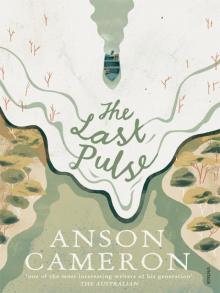 The Last Pulse
The Last Pulse Stealing Picasso
Stealing Picasso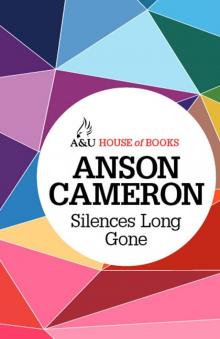 Silences Long Gone
Silences Long Gone